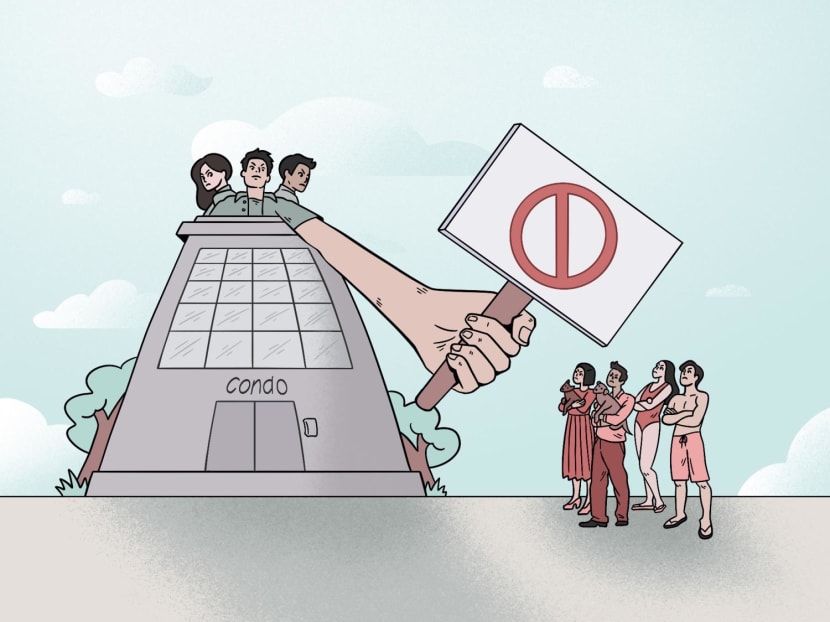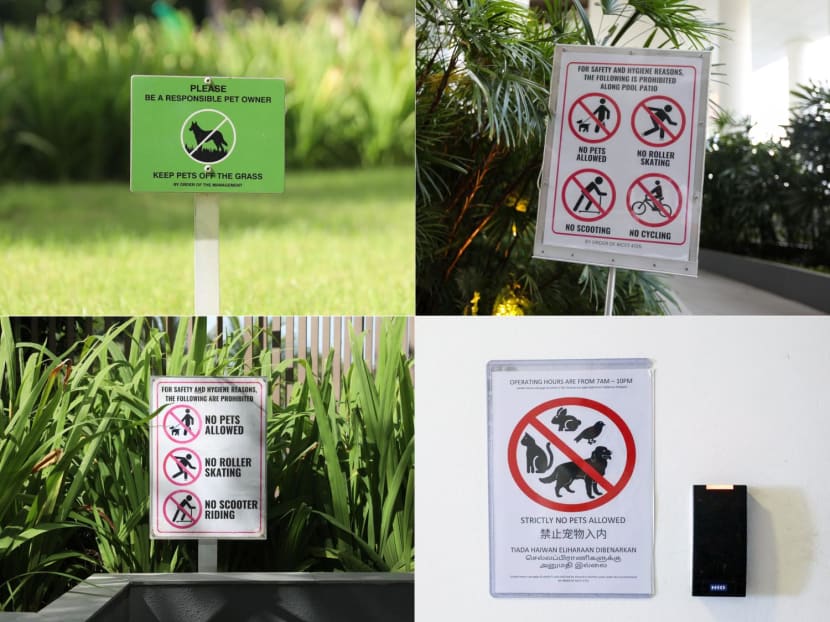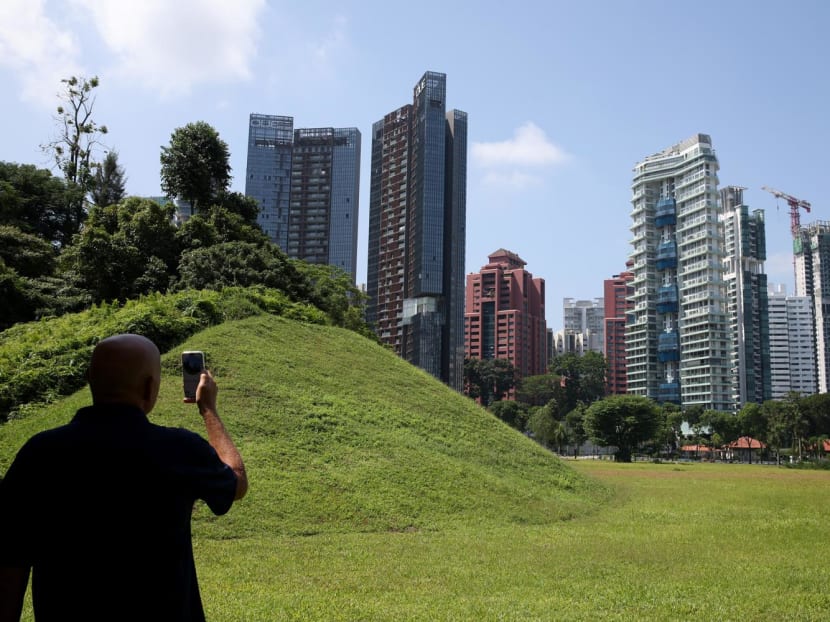The Big Read in short: When condo by-laws turn luxury living into a nightmare for some residents
SINGAPORE — Ms Chen YL often feels like a “criminal” whenever she takes her two dogs out of her condominium unit.


This audio is AI-generated.
- Some condominium residents have to live with what they feel are overly punitive and restrictive by-laws, such as bans on dogs and music in certain areas
- The presence and severity of condo rules largely depend on the culture of each condo's management council and its residents, who can create and enforce by-laws
- These rules also tend to be created in response to complaints and feedback from the residents themselves
- While residents who disagree with certain rules can take part in the process to repeal and create these by-laws, management council members say participation is typically low
- Some condo residents say it may be better if Singapore had more standardisation and oversight of condo by-laws to prevent management councils from overstepping
SINGAPORE — Ms Chen YL often feels like a “criminal” whenever she takes her two dogs out of her condominium unit.
The 35-year-old software procurement lead said that if she is caught walking the dogs within the condominium’s premises, she might be slapped with a S$200 fine.
At her condominium in the eastern side of Singapore, a by-law does not allow dogs to walk anywhere on level one of the building. This extends to areas near the pool, barbecue pits, function room, and gym.
A by-law is a rule or regulation that residents must follow while living in the condominium. These by-laws have long been the subject of much debate, since what is draconian for some residents may be deemed as reasonable by others living in the same building.
“It's gotten quite dramatic, to a point where some of our neighbours have to go through the car park to bring our dogs to the back gate, which is quite sad.
“It feels like you're doing something wrong, but you're just walking the dog,” said Ms Chen.
Talk to condominium residents and complaints about overly punitive and absurd by-laws such as these will likely come up.
But these rules are not introduced on a whim — they are typically made in response to other residents’ concerns and complaints and go through a voting process.
TODAY spoke to several people who sit on their condominiums’ management councils, commonly referred to as the Management Corporation Strata Title (MCST), who said that the rules across different condos vary quite widely because they spring up according to the unique experiences, priorities and needs of the residents in each estate.

WHY IT MATTERS
In Singapore, condominiums are governed by two sets of by-laws. One set is the prescribed by-laws established by the Building Maintenance and Strata Management Act (BMSMA), which is compulsory and standard across all condominiums.
Standard by-laws address essential issues such as the proper use of common property, including hallways, lifts, and recreational areas. These laws also deal with noise control, which limits permissible noise levels during certain hours to prevent disturbances.
The other set of by-laws, called additional by-laws, is created specifically by the MCST of each condominium and is thus unique to each.
These can include detailed regulations on the use of facilities such as swimming pools and gyms, specific parking rules, including designated spots and restrictions on commercial vehicles, as well as pet-related policies.
The management council or a resident can propose an additional by-law. This proposal is then added to the agenda of the Annual General Meeting (AGM) or an Extraordinary General Meeting (EGM).
Residents will be notified, allowing them to review the proposed rule and prepare for a discussion. The proposal is then discussed during the AGM or EGM, where residents can express their opinions.
During the meeting, management councils may also repeal or amend existing additional by-laws.
Most additional by-laws can be repealed, amended or created by a special resolution passed at a general meeting.
A vote is then conducted to approve or reject the by-law. Typically, a special resolution must be approved by at least 75 per cent of the owners who turn up for the meeting.
Residents are expected to comply with the new rule, and any violations may result in penalties or other consequences as outlined in the by-law.
As Mr Dennis Tan, the secretary of the MCST Association of Singapore, said: “The spirit of the BMSMA is self-governance”.
The BMSMA governs the management and maintenance of strata-titled properties in Singapore, including condominiums, outlining the responsibilities of the management corporation (management council) and residents.
This means that the kind of by-laws a condominium enacts depends on its “community spirit”, he said.
Mr Tan added that management councils decide on some by-laws that can be unique to that particular estate, resulting in significant differences in living experiences among different condominiums.
It also means that crafting by-laws for a condo is a delicate balancing act, as the competing concerns and needs of sometimes hundreds of residents need to be reflected fairly.
In 2018, the BMSMA was amended to cap the number of proxy votes one can hold at annual general meetings.
A person can now only be appointed proxy holder for 2 per cent of the total number of strata lots in the development, or two lots, whichever is higher.
This was done to prevent situations where a handful of residents can push through their agenda by convincing neighbours who do not intend to show up for meetings to hand over their voting rights.
Mr Oo Gin Lee, 55, said the cap was a good move that has curbed people's ability to have excessive influence over their neighbours. He has been a member of the management council at The Hillside at Upper Bukit Timah for nearly a decade and was its chairman for about seven years.
But Ms Chen YL feels the regulations could go further by limiting residents to holding only one proxy vote.
"Groups of people with the same agenda can still huddle together to cast the same votes," she said. "It puts too much power in a single person that you barely know."
It may be inevitable, then, that some residents of a particular estate will find the by-laws too harsh, even as others may consider them reasonable and just.

THE BIG PICTURE
“People need to understand that when you live in a condo, you live in a community. There’s a lot of give and take,” said Mr Oo.
Another management council member from a condominium in the central area, who wanted to be known as James, noted that experiences at different condos can vary greatly due to the diverse composition of management councils.
Sometimes, the influence of a single, dominant member on a council can sway decisions.
Mr Oo agreed, saying: “A lot of people, when they buy their condos, don’t realise a lot of your life in a condo is affected by the culture of your management council.”
Ms Chen YL's experience shows the culture among all residents matters too. She said she has had many run-ins with her neighbours when they saw her walking her dogs in areas where they were not allowed.
“A couple of times, I was walking my dog past the gym, and people in the gym would come out of the gym and tell me to go away,” she recounted.
“We have had neighbours tail us or follow us behind with their phone cameras on because they’re just waiting for your dog to pee.”
She added: “This is not just enforced by the MCST anymore. It’s basically everyone. Everyone is now like citizen police. It’s very exhausting.”
Over at Riverfront Residences, which has a similar rule — management has put out a notice banning dogs from walking on the ground floor — residents told TODAY that security officers have even started filming errant pet owners.
“I’ve had to confront (the security officers) multiple times, and I have had to be quite forceful in saying that it’s an infringement of PDPA,” said resident Ms Jolene Ng, 31, referring to the Personal Data Protection Act.
Another resident, Mr Christopher Yeong, said he has also been filmed by security officers while he was on the first floor with his dog, which made him feel uncomfortable.
The 32-year-old who is in the media industry added: “It’s quite a shame to be in fear on your property.”
In response to queries from TODAY, the management office at Riverfront Residences said the regulations are part of the estate house rules and pet owners are responsible for pets when they transit through common areas like carparks, corridors and lift lobbies.
House rules are more informal guidelines set by the MCST or managing agents. Unlike by-laws, house rules do not require approval through a formal voting process.
But while residents often have strong feelings about the by-laws of their condos — especially ones they disagree with — not many participate in the voting process that leads to the creation or repeal of these by-laws, Mr Oo noted.
It is hard to meet the minimum requirements of the quorum for the AGMs most of the time, he said, and meetings tend to be well-attended only if there is an issue on the table that affects all residents.
THE BOTTOM LINE
For their part, many residents who spoke to TODAY said that while they appreciate that the management system is a democratic one, they find it hard to make time for the meetings amid their existing commitments.
But the council members pointed out that without getting involved, residents are missing out an opportunity to shape the environment they live in.
At the same time, condo residents told TODAY that more must be done to standardise how by-laws are implemented across all condominiums in Singapore, to ensure that estates are not run by management council members with their own personal agendas.
Without standardisation, “everbody’s doing their own thing”, James noted.
“The Building and Construction Authority (BCA) should step up and lay down the rules in a transparent and objective way,” said James.
Ms Ng agreed, saying that there should be some kind of oversight of management councils.
“Just because (an influential council member) might love dogs, then his whole condo is just for dog owners and dog lovers,” she said. “But if he hates dogs then straight away, dogs are banned. Where are the checks and balances?
In response to a query from TODAY on these suggestions, BCA said that unit owners should play an active role in the decision-making process by attending meetings where their input would directly impact the estate’s management and by-laws.
It added that while it does not regulate MCST by-laws, it provides guidance through a set of Strata Management Guides (SMGs) to help MCSTs understand the key provisions in the BMSMA and adopt good practices of strata management.
In the meantime, Mr Oo said those who are unhappy with by-laws in their condo should step up so they can get their voices heard.
“How do you solve the problem? You need to get into the management council and serve. If your management council has no one with a pet, your condo will not be pet-friendly,” he said.










